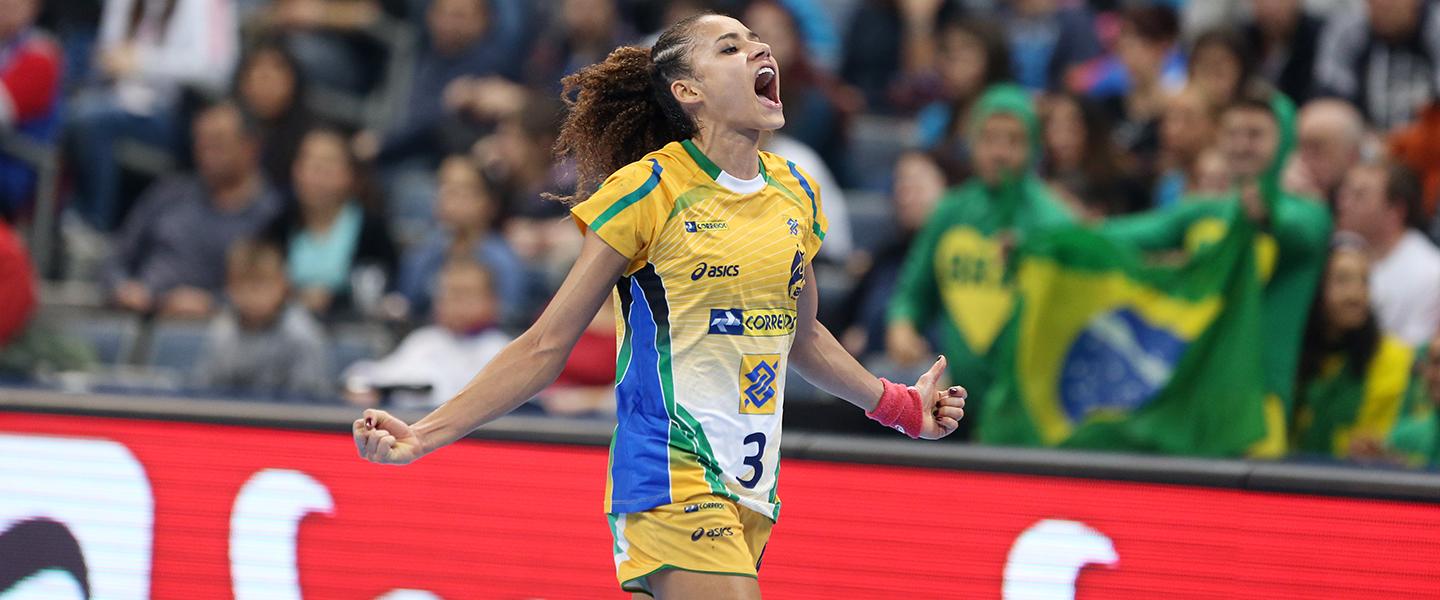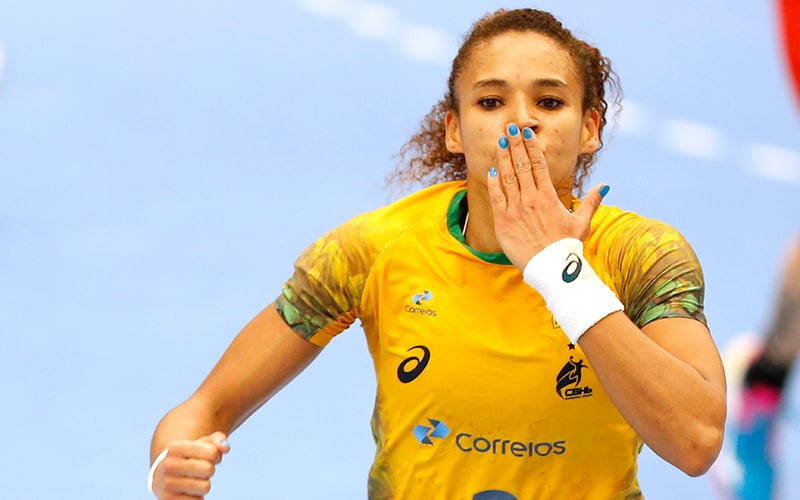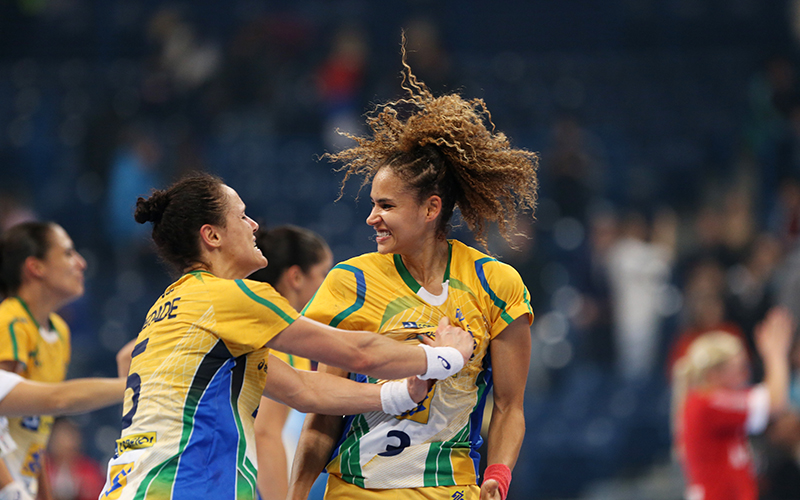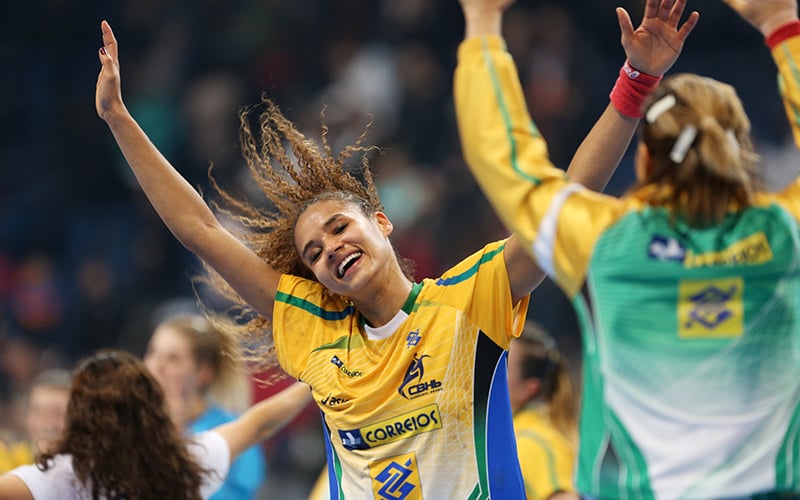News
‘I cannot stop playing’ – Nascimento’s epic handball journey continues at Germany/Netherlands 2025
23 Nov. 2025

Alexandra Priscila do Nascimento Martínez: world champion, world handball player of the year, multiple Pan American Games gold medallist, Champions League finalist amongst many other titles and honours – and, now, set to appear in her eighth IHF Women’s World Championship appearance with Brazil, this time, at Germany/Netherlands 2025.
Retirement? What retirement?
Retirement has been a word associated with the Brazilian right wing in recent years, not surprising, considering she is now 44-years-old.
Born in the city of Limeira, 150km north-west of the city of Sao Paulo, Nascimento has not played in an IHF Women’s World Championship since Japan 2019, but is now set to be back on the global stage once more.
Along with husband – and former Chile men’s international, who played in Chile’s first-ever senior world championship match, at Sweden 2011 and scored their first-ever goal in the competition – Patricio Martinez Chavez, Nascimento announced in early 2022 her pregnancy for their first child and with it, retirement from club handball, while at French side Bourg-de-Péage.
“All the time previously I was saying I want to be a mother, I was telling my husband, my friends, ‘maybe I will stop playing because I want to be a mother’,” explains Nascimento on the phone from Brazil’s pre-world championship training camp.
“That was my dream and very important to me, but then I played another year and another year. When I got to 39-years-old I said to myself ‘no, now it’s time to stop’.”
Having moved to Spain with Patricio whilst pregnant, progressive Spanish club AtticGo Club Balonmano Elche saw an opportunity to work with the legendary player during her pregnancy, creating an environment fit for her maternity journey while helping the young squad and club itself revolutionise their daily regime.
A few months later, in August, little Lia came along, with Nascimento managing her fledgling family and club career together in unison. And just a few months later, in December 2022, she made her club comeback.
“After Lia was born, I returned to the court and played for Elche for the last six months of the season, before signing a one year extension for the whole of the next season,” adds Nascimento, who finished in Spain at the end of the 2023/24 season.

This prompted talk around another ‘retirement’, but this was to prove not true, again.
“After this 18 months in Spain, I was thinking about it and in my mind, I thought it was time to stop to playing. I spoke with my Patricio, and said that I will just stay at home and take care of Lia – I believed that this was enough for me,” said the player, who met her future husband at the Pan American Games.
“But after two months maximum, I spoke with Patricio again, and said; ‘oh my God, I need to make something else. I cannot just stay at home and every weekend just go and watch handball. I cannot stop playing’. I just said to him that I don't know what I will do, but I need to come back and play.
“I began to speak with some friends about it, but just waiting to see what will happen. In November/December last year, Chana Masson, who was goalkeeper for Brazil (1999-2012) and the first player to come from Brazil to Europe to play club handball and open the door for us all, invited me to come to join her at AC Life Style Handball Erice in Italy.
“The team is just five years old and they want to improve, to be professional, so I accepted this. We went with everything there, and I now have a contract there until 2027,” says Nascimento, who was announced as a new signing in January 2025.
“I am really, really happy there. There are a lot of nationalities; Italian, Argentinean, French, Spanish, Croatian, Romanian, Belarusian – for me, this is really funny. I love this atmosphere and to meet new people, plus Lia has turned three now, so I can continue to play.”

Club return confirmed, national team follows – with a historic twist
Next up was a return to the national team – despite rumours she had retired from Brazil duty too.
“If I'm honest, I never told anybody that I was out of the national team. I never retired from the national team. I just waited for the coach for the national team to invite me again, and I just prepared myself. I continued training, continued to give my best for my body and my mind,” says the Brazilian, who was crowned IHF World Player of the Year in 2012.
“There was a period where they were looking at younger players and I respected this process, but there has always been a long list of players so when I was in Spain, I wrote to the coach (Cristiano Silva) and said; ‘When can I come back? Don't forget me. I'm here if you can give me a possibility to prove it, to train and then you can see me’.
“He started asking questions, we spoke a lot, and three months ago he told me I can continue with national team. I said ‘yes, why not?’. I don't have anything to lose, only something to win, because playing for the national team is a great experience.
“It was so big to return because my first international week back was in September and we were based in Austria,” adds Nascimento, who played for Austrian side Hypo Niederösterreich from 2003-2014.
“To return and it be in Austria meant a lot, because the first time I left Brazil was when I was 22-years-old and I went to Hypo and stayed there for 11 years. This was the beginning of my professional career, of playing in the Champions League, strong training and very good coaching. While at the camp I met a lot of my good friends from my time in Austria and it was really, really nice.
“I could not haven chose a better moment to come back for the national team. I enjoyed it a lot and we even played a friendly game against Austria. It was all really nice and it is a pleasure to be part of my national team again, it’s amazing to come back now, a dream – plus I get to come to the world championship with my baby and Patricio.”

Imparting knowledge, living in the future and feeling good
With a break of six years between her last international championship with Brazil, at the 2019 IHF Women’s World Championship in Japan, Nascimento is feeling ready to go, ready to use her experience and, crucially, ready to learn.
“We are in 2025 and I need to see how the young players think now,” says the four-time Pan American Games winner. “I'm 44 years old, and I could be the mother of some of the players in the squad, but I respect them. I have more experience, but now, my job with the national team is totally different. I don't think; ‘we need to work like we worked before’, I need to mix these things.
“A lot of young players come to me and ask how I did things, what I think and how they can improve with every training. This for me, is a good feeling – I just want to help. I say all the time: ‘if I can put something positive, I will do’, ‘if I can’t, it’s much better to shut up’.
“I say to them that some days the team or a player will have a good day, but that some days it doesn’t go the way you want to or what you try goes wrong. The goal can be empty, but you can shoot and you will miss. In world championships you to have consider everything, plus you have injuries too, so it's very important to be focused, respect every opponent and give your best.”
That ‘best’ is important for Nascimento off court too, return to sporting action in peak, physical fitness after giving birth and maintaining it as she approaches her mid-40s.
“I really feel very well and my body is good. Yes, I am 44 years old, but I take care of my body,” explains Nascimento, who ended as top scorer at the 2011 IHF Women’s World Championship in Brazil with 57 goals.
“I eat good and try to eat healthy more or less. Patricio has helped me a lot. During the week, we don't eat sugar. We try to really respect the week, the food, the exercise, and then on Saturday or Sunday, we can eat pasta, burgers, a little sugar – these things. We try to make the same with Lia because she's three years old and doesn’t go to school at the moment so she never eats sugar, because we know the sugar is not good for people, for the body, and for kids.
“My mind is okay too. I'm actually nervous to come back to international handball and play in a new championship again, but I am calm in my own career. I have managed my nervous insecurity well and I know my place. I know exactly what I need to do, and I always try and give my best – this is for sure.”
Learning from mistakes and disappointment to make it to the top of the world
That mental strength has proved to be an integral part of Nascimento’s successful career so far, one which can be mapped via IHF World Championships across three decades with an appearance at Germany/Netherlands 2025.
Her first appearance was at the 2001 IHF Women’s Junior (U20) World Championship in Hungary before she progressed to her first senior event – Croatia 2003. This was followed by Russia 2005, France 2007, Brazil 2011, Serbia 2013, Denmark 2015 and Japan 2019.
And her experience at Croatia 2003 laid the mental foundation for what would be a journey to the top eventually.
“I'm remember my first senior world championship so good. I was so nervous, really, so nervous. When I had the chance to play, and received the ball alone I couldn't catch it. I was really nervous in this moment and I wasn’t happy for what I did there. But every young player needs to have these moments to improve themselves, to learn and to get the experience,” says Nascimento about the event in Croatia which saw Brazil finish in 20th.
“In fact, because we were in Croatia, a club representative of Hypo was there because they needed a right winger and came to see me play, but, as I said, I played very badly, but still was asked to go to Austria for a trial and training after the world championships to see if I could improve. At that time, Gunnar Prokop was the coach at Hypo, and I trained very well, so they wanted to keep me.
“I returned back to Brazil and (Brazil national team player) Daniela Piedade recommended me to join Hypo as she had already been there for two years, she said I was young and talented, but that I would need to train a lot since I had never played outside of Europe except for that junior world championship.”
And in Austria, the rest was history, winning the national league and cup double every year she played (2003-2014) for them, this was backed up by a Champions League final (2008) and EHF Cup Winners’ Cup (2013) title.
And a decade after that senior world championship debut in 2003 Nascimento would lead her team to gold at Serbia 2013, but the foundations were made for the podium-topping campaign a year earlier, at the London 2012 Olympic Games, according to the player.
“In London, the period and the feeling between us was so good and in the quarter-final against Norway we began the first half very, very, good – we were too good (Brazil led 13:9 at the break),” she explained. “But in the second half, we played a catastrophe; the baddest game of our lives. We lost and were out (Norway won 21:19). This was painful, but we understood that this was the preparation we needed to win the world championship in Serbia the following year. This is the handball life.”
In Serbia, Brazil won all five of their preliminary group games in Niš (Algeria, China, Serbia, Japan and Denmark) before a Round of 16 win over Netherlands, quarter-final additional time victory over Hungary, semi-final win over Denmark and gold medal defeat of hosts Serbia 22:20.
The historic victory saw Brazil become the first South American country to win the title and second only non-European team to do so, after Korea Republic in 1995.
“2013 – this was an unbelievable year,” says Nascimento, sighing with emotion like it was yesterday. “Actually, there was a lot of pressure in 2012 I was voted as the best player in the world, and everybody came to interview me with questions like ‘ah, now Brazil have the best players, for sure, Brazil will win this world championship’ – but my answer was always the same, with a feeling in my stomach: ‘this is true, but we need to play together – every player is very important, but there's not just one player who can win the game,’ but, really, there was pressure on me.
“I did good with the pressure though. My husband was important too in this moment. We spoke a lot, and he said to me; ‘Don't stay in the past, you were the best in world, but now you need to continue to give your best, forget this. The name and the t-shirt don't win nothing – if you want to win this you need to continue to give your best, and you will see in the end.”
And despite winning their first – and only – title to date, Nascimento’s main memory is not lifting the trophy in front of nearly 20,000 spectators in Belgrade, but of their dramatic quarter-final victory against Hungary (33:31, 26:26, 3:3, 4:2).
“We played together. We didn’t lose one game – we even played two times against the hosts Serbia – that was unbelievable and the final was amazing, but the game which has stayed in my mind all the years is the Hungary quarter-final with 60 minutes and two additional periods, it was unbelievable,” said Nascimento about the game in which she finished top-scorer with 10 goals.
“I have a very good memory on every moment. The 60 minutes finished and then we have 10 minutes more and needed to play again, but we were so certain we would win, this was our feeling. What was so beautiful that we improved slowly with every game in that world championship. We didn’t play well in the first game, but we improved and when we played the stronger games or faced important moments, we were prepared for them – this was very, very good for us. It was amazing, unbelievable.”

First stop in 2025: Stuttgart
Nascimento and her Brazilian team will throw-off their 2025 IHF Women’s World Championship campaign against Cuba in Stuttgart on Thursday 27 November, followed by a clash against Czechia and then Sweden in what will likely be a preliminary group table-topping decider.
“Brazil have played against Cuba a lot in the Pan American competitions. Their players are very strong, very tall, but don't have the experience with handball. They have the talent, but don't have the experience, however, from my experience, we need to be careful,” says Nascimento about her first test in Germany.
“I don't know much about Czechia, but we have started looking at our opponents with video analysis, like we do with all the teams. We know Sweden are a very strong team – they have a strong defence, strong attack, deep experience, and out of our three group opponents, they are the strongest.
“We need to respect every opponent, because if we don't, and we don’t go 100% into these matches, anything can happen. We will fight and give 100% every game. I believe we have a big chance to go to the main round.
“But what can we achieve? It's not so easy to answer because the Brazil national team changed a lot from when we won the world championship at Serbia 2013. Now, we have a young team, but one led by Bruna de Paula – she is playing for Győr and now, for me, is in in the best form of her career. We also have Matieli (Patricia Matieli Machado), the middle back, who has played a lot of years in Poland, good goalkeepers; Renata (Lais de Arruda) and Gabriela (Moreschi).
“It's very complicated to speak about what we will reach at Germany/Netherlands 2025,” she adds. “We will try to improve our handball, to give experience to the young players who have come to be part of our national team – I’m helping them to find the way by speaking about my experience. If I see the players are nervous and I will go and say; ‘everything's okay, don't worry, we can do this together’. We will make it step-by-step, respect every opponent and our first fight will be to go for the main round. This is the first step and, in the end, we will see.”

